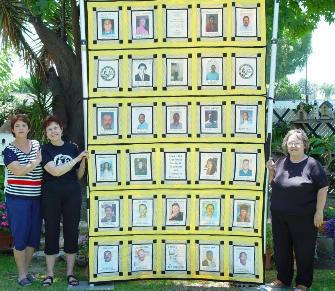|
More
Than
a
Thousand
Drug
Offenders
Continue
Doing
Life
Sentences
Following
Defeat
of
California
Three-Strikes
Reform
Initiative
11/5/04
An initiative that would have amended California's notorious three-strikes law to make it apply only to offenders whose third strike was a violent crime that appeared headed for victory was derailed by a last-minute scare campaign led by Gov. Arnold Schwarzenegger. According to the office of the Secretary of State, the measure, which would also have allowed some 7,000 nonviolent third-strikers to apply to have their 25-years-to-life sentences reduced, was defeated by a margin of 53% to 47%.
Although sending someone to prison for life on a drug possession charge or for what would normally be considered misdemeanor theft would normally be considered cruel and unusual punishment, the US Supreme Court last year disagreed, upholding the law (https://stopthedrugwar.org/chronicle-old/277/courtstrikesout.shtml). While California voters appeared poised to strike down the law's most onerous provisions, thanks in part to a well-funded campaign publicly fronted by well-known crime victim relative Joe Klaas (http://www.yeson66.org), the last-minute effort led by Gov. Schwarzenegger resulted in the most dramatic reversal of fortune for an initiative in California history. While support for the reform measure was running at 65% going into the last weeks of the campaign, by the week before the election support had dropped to 55% as Gov. Schwarzenegger, a Republican, former governors Pete Wilson (R), Gray Davis (D), and Jerry Brown (D), along with the California prison guards union embarked on a furious push to defeat it. Schwarzenegger aired factually-challenged television ads warning that thousands of violent criminals would be freed, while telecommunications billionaire Henry Nicholas, founder of Broadcom, pumped more than a million dollars into the late ad blitz, the Los Angeles Times reported. "I've seen declines before, but I've never seen it this abrupt," Field Poll spokesman Peter DiCamillo told the Times late last week. "The linkage of Arnold himself with the 'no' side in a very visible way sunk into voters this week." By Tuesday, momentum had swung against the initiative. Still, three-strikes reformers vowed to try again. "Nothing ends today," said campaign leader Joe Klaas, who has battled for 10 years to enact common sense reforms. Former Gov. Wilson had used the story of Klaas' daughter, Polly, victim of a vicious murder, to rally support for the original three-strikes initiative. Joe Klaas and his father campaigned against it after learning it would also apply to nonviolent offenders. "Opponents of Proposition 66 pointed to specific things they opposed in this initiative, but always acknowledged the flaws in the three strikes law that still need to be fixed. Those flaws remain and this fight goes on," he added in the post-defeat statement. Proposition 66 supporters pledged to redouble and broaden their efforts, reaching out to opponents -- legislators, district attorneys, editorialists -- who acknowledged the serious flaws in the three strikes law, to find solutions that can and will be enacted. "It's still as absurd as ever to give shoplifters and petty drug offenders the same sentences as rapists and armed robbers," said Klaas. "We now ask Prop. 66 opponents to work with us to preserve three-strikes and fix these unjust flaws."
PERMISSION to reprint or redistribute any or all of the contents of Drug War Chronicle (formerly The Week Online with DRCNet is hereby granted. We ask that any use of these materials include proper credit and, where appropriate, a link to one or more of our web sites. If your publication customarily pays for publication, DRCNet requests checks payable to the organization. If your publication does not pay for materials, you are free to use the materials gratis. In all cases, we request notification for our records, including physical copies where material has appeared in print. Contact: StoptheDrugWar.org: the Drug Reform Coordination Network, P.O. Box 18402, Washington, DC 20036, (202) 293-8340 (voice), (202) 293-8344 (fax), e-mail drcnet@drcnet.org. Thank you. Articles of a purely educational nature in Drug War Chronicle appear courtesy of the DRCNet Foundation, unless otherwise noted.
|
||||||||||||||||||||||||||||||||||||||||||||||||||||||||||||||||||||||

